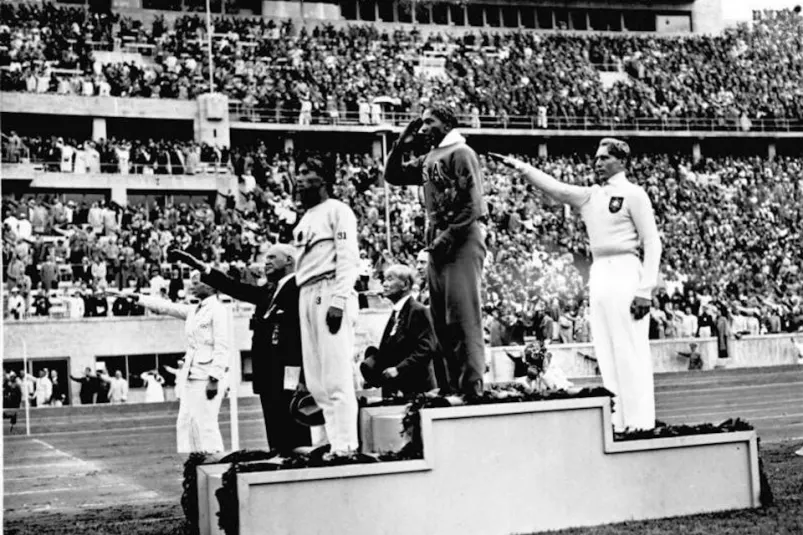The Olympic Games of Shame (Berlin 1936)

Berlin was already supposed to host the 1916 Olympic Games but, in the midst of preparations, the First World War broke out, preventing the celebration of the event. It was 20 years later that Berlin's new, gigantic Olympic Stadium was built to host the Games and was lit by the Olympic flame.
Olympic and Political Games?
These games took place three years after the beginning of Chancellor Adolf Hitler's term of office, when he saw it as a platform to praise Nazi Germany and prove the superiority of the Aryan race. More than a sporting competition or a demonstration of Germany's economic power, the Olympic Games are part of a large-scale political operation: made unpopular by Nazi totalitarian excesses, Germany must be seen as a country where it is good to live!
The first discriminations of the Nazi regime were put in place as early as 1933. In 1935, as a result of the Nuremberg Laws, German nationality was taken away from Jews and their social status was shaken (mixed "German-Jewish" marriages were prohibited and deemed null and void). In this context, violence against Jews increased.
Hitler camouflaged this atmosphere of mistrust with demonstrations of opulence and refinement. A gigantic stadium with 100,000 seats and an Olympic swimming pool with a capacity of 20,000 are built next to a superb athletes' village.
The city itself presents itself in all its finery and the Germans are instructed on how to behave in order to be as friendly as possible. Throughout the games, anti-Jewish measures are suspended, the blood-red windows of the newspaper "Der Stürmer" are changed, and anti-Semitic signs are removed. Swing bands play in public places. Berliners' skirts are shortened by five centimetres, and Berliners are even instructed to give up their seats in the underground if they see tourists.
In the United States, a strong movement denounces a masquerade and calls for a boycott of the Games following rumors of the exclusion of Jewish athletes from the German team. The absence of the USA from the Olympics would have been a disaster in Hitler's plan. The latter retaliated by poaching Helene Mayer and Gretel Bergmann, two Jewish athletes forced to go abroad. Asked about these "Jews-alibi", Hitler later added that Jews are simply "not very good at sports".
The first Olympic Games broadcast on television
The Olympics are finally held in Germany and begin with a majestic opening ceremony. When the chancellor appears, 100,000 arms rise to greet him. These Olympic Games are all the more popular because they coincide with the birth of television. More than 160,000 people will be watching the highlights of the Games on the small screen.
Germany: winner of the Olympics?
However, it was neither the splendour displayed by Germany nor the performances of the German team that finished first in the games with a total of 89 medals (including 33 gold medals) that left a lasting impression on the memories, but rather the four gold medals of the legendary athlete Jesse Owens and the anger of Hitler leaving the scene to avoid saluting the black American champion.
If Hitler thought he had planned everything to make the games to his advantage, it was without counting on the extraordinary performance of the American athlete who, in particular, beat the German Lutz Long in the long jump at the end of an astonishing competition that will give rise to a true friendship between the two men, calling into question Hitler's declarations on the so-called "inferior" races.
The event was covered by Leni Riefenstahl, the Reich's official filmmaker, who was given the task of shooting an official film by the Regime. Riefenstahl demanded for the creation of his project "The Gods of the Stadium", a team and extraordinary means with a budget of 1.8 million Reichsmarks. This documentary remains a historical record of the Games.
Recommendation: We recommend watching the documentary "The Gods of the Stadium" and then "Les jeux d'Hitler" by Jérôme Prieur (2016). This last documentary highlights the Nazi propaganda in the context of the Olympic Games, which were intended to offer the world a grandiose showcase for the international recognition of Nazi Germany.
Source of image: Bundesarchiv, Bild 183-G00630 / Unknown author / Berlin, Olympiade, CC-BY-SA 3.0

Raphaëlle Radermecker
Author
With a curious personality and a passion for well-chosen words, writing and discovery are my two passions. Berlin intrigues and fascinates me, with its cultural and artistic richness, its modernity and its ability to constantly renew itself.